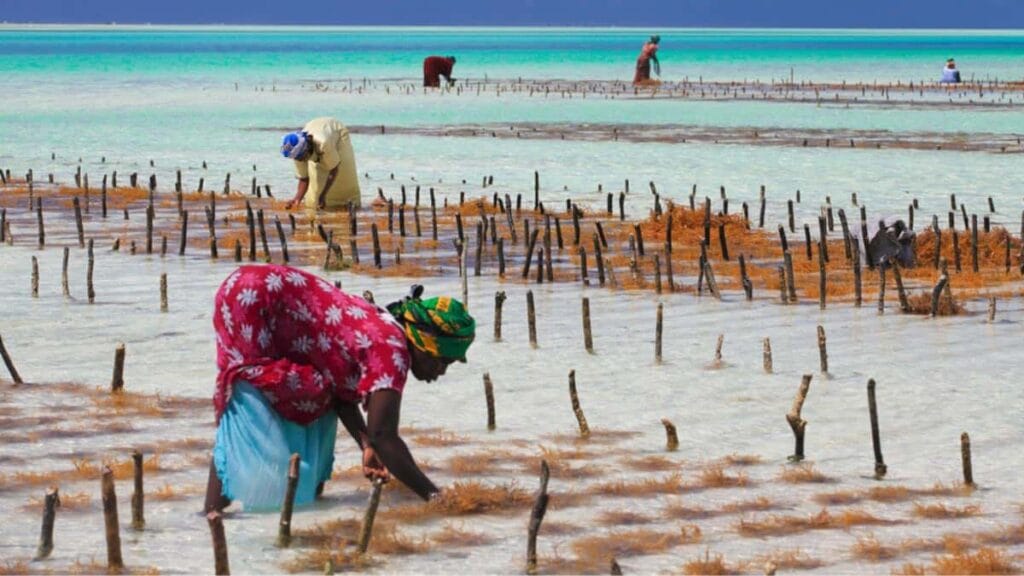

Zanzibar, renowned for its stunning beaches and rich cultural heritage, is also making significant strides in sustainable agriculture through seaweed farming. This innovative industry not only contributes to the island’s economy but also plays a crucial role in empowering women, fostering community development, and promoting environmental sustainability. At Future African Safari, we highlight the transformative impact of seaweed farming in Zanzibar, showcasing how this practice is reshaping lives and preserving the island’s natural beauty.

Empowering Women through Seaweed Farming
Economic Independence
Seaweed farming provides women in Zanzibar with a reliable source of income, enabling financial independence and improving their standard of living. By participating in this lucrative industry, women gain economic empowerment, allowing them to support their families and invest in their futures.
Skill Development
Engaging in seaweed cultivation and processing equips women with valuable skills in agriculture, business management, and sustainable practices. This knowledge not only enhances their employability but also fosters entrepreneurship within local communities.
Community Leadership
Women involved in seaweed farming often take on leadership roles within their communities, advocating for sustainable practices and inspiring others to engage in eco-friendly initiatives. Their involvement strengthens community bonds and promotes gender equality.
Sustaining Zanzibar’s Economy
Diversified Income Streams
Seaweed farming diversifies Zanzibar’s economy, reducing dependence on traditional sectors such as tourism and agriculture. This diversification enhances economic resilience, especially during fluctuating tourist seasons or environmental challenges.
Export Opportunities
High-quality seaweed products, including carrageenan and agar-agar, are in demand globally for their use in food, cosmetics, and pharmaceuticals. By tapping into international markets, Zanzibar can boost its export revenues and establish itself as a key player in the global seaweed industry.
Job Creation
The seaweed farming industry generates numerous employment opportunities, from cultivation and harvesting to processing and distribution. This job creation supports local livelihoods and contributes to overall economic growth on the island.
Environmental Sustainability
Coastal Ecosystem Protection
Seaweed farming promotes the health of Zanzibar’s coastal ecosystems by providing habitats for marine life and improving water quality. Seaweeds absorb excess nutrients and carbon dioxide, mitigating the effects of pollution and climate change.
Sustainable Practices
Adopting sustainable seaweed farming techniques ensures that the industry remains environmentally friendly. Practices such as integrated multi-trophic aquaculture (IMTA) enhance biodiversity and maintain the balance of marine ecosystems.
Climate Resilience
Seaweed farms act as natural buffers against coastal erosion and storm surges, protecting Zanzibar’s shores from the impacts of extreme weather events. This resilience is vital for safeguarding the island’s infrastructure and natural landscapes.
Conclusion: A Bright Future for Zanzibar
Seaweed farming in Zanzibar exemplifies the harmonious blend of economic growth, women’s empowerment, and environmental stewardship. By supporting and expanding this industry, Zanzibar can achieve sustainable development while enhancing the livelihoods of its residents. At Future African Safari, we are committed to showcasing and supporting initiatives that drive positive change and preserve the island’s natural and cultural heritage.
Ready to explore Zanzibar’s thriving seaweed farming communities? Contact Future African Safari today to include a visit to local seaweed farms in your itinerary and witness firsthand how this sustainable practice is empowering women and sustaining the island’s economy.
Explore more about our safari packages and discover the best of Zanzibar with Future African Safari. Your unforgettable African adventure starts here!

